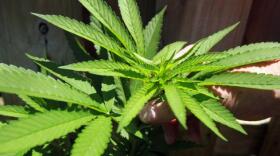(Editor's note: This discussion originally aired Feb. 1, 2021)
Like almost every other industry in the state, Nevada's cannabis industry was hit hard by the coronavirus pandemic when it first started.
However, Layke Martin, executive director of the Nevada Dispensary Association told KNPR's State of Nevada that after rules were changed to allow home delivery and curbside pick-up services, the industry bounced back in mid-2020.
"In the summer, the industry proved resilient," she said. "We maintained jobs for more than 8,000 Nevadans, and we ended the fiscal year 2020 bringing the state $105 million in excise tax revenue that goes to education."
Overall in 2020, Martin said, taxable sales of marijuana were up $45 million from the year before.
She added that the cannabis industry will be lobbying lawmakers during this legislative session to make curbside pick-up services permanent.
While the legal market for marijuana is doing well, the black market is still its biggest competition. The problem is the price. Legal growers and dispensaries pay taxes, which makes their products more expensive.
"So what we have to try to do and what we do is try to provide a better product and better service at a competitive price," she said. "And to keep the price competitive, we need to make sure that the tax is fair."
Tyler Klimas is the executive director of the state's Cannabis Compliance Board. He said there needs to be a balance between bringing in money for the state and not making prices too high so that people will turn to the black market.
"It is something that we constantly revisit as well," he said. "The Department of Taxation sets fair market value every six months on product lines. So, we have mechanisms in place to constantly evaluate and re-evaluate where we're at."
Josh Garber is a detective with the Las Vegas Metro Police Department. Despite the legalized marijuana market in Nevada, the illegal market is still alive. In 2020, seven homicides were linked back to illegal marijuana, along with dozens of other crimes.
He also said 11 fatal car crashes and 1,100 DUIs arrests were linked to marijuana.
Metro is also still busting illegal indoor grow operations. Garber said they found 17 grow operations in 2020 and recovered more than 4,000 pounds of plants.
"In 2013, when we had a full-time indoor marijuana grow team - which their whole job was to investigate illegal marijuana grows inside residents, where it's extremely common - they investigated 111 grows. Out of that 111, they recovered 4,945 plants," he said.
Garber said those numbers show that the illegal growers now are growing a lot more individually than they were when recreational marijuana was not legal.
Besides the illegal growing operations, one of the biggest problems that remain for police is the city's tourists, he said.
"[Tourists may] not know the difference between illegal and legal when they see an advertisement on the internet or on a billboard and assume, 'Hey, that's perfectly legal,' and they don't what the rules are or who the legal dispensaries are for them to purchase [from]," he said.
Currently, people are only allowed to use marijuana products in their own homes. Public consumption is not allowed.
"That's pretty crazy when we're trying to encourage people to come to Las Vegas and this is a legal thing that you can go to a dispensary and buy, but then, if you're from out of state, there is no place that you can use it," said Clark County Commissioner Tick Segerblom.
He's hopeful that will change soon.
The city of Las Vegas and Clark County were ready to start allowing consumption lounges, but the state legislature stepped in 2019 and stopped the two jurisdictions from allowing the lounges.
That moratorium is set to expire in June, and Segerblom said the county is ready to move forward with approving lounges.
He believes they could be an important part of the city's tourism industry.
"It's really critical, I think, that we have some location," he said. "Now, how we do that and how we make sure that people don't get in a car and drive away, we can talk about that. But the fact is we have to have a space where people can use it, especially people from out of town who don't have a house."
Segerblom believes the state should create a structure for how consumption lounges are created.
Klimas said the Cannabis Compliance Board recently finished a report for the state legislature, which opened its 2021 session Monday, about consumption lounges and how they can work and be regulated.
He said that the main goals of the CCB - ensuring minors can't access marijuana, keeping any criminal elements out of the legal market, and health and safety of the product - will also apply to consumption lounges - if the state approves them.
Layke Martin, executive director, Nevada Dispensary Association; Tick Segerblom, commissioner, Clark County Commissioner; Tyler Klimas, executive director, Cannabis Compliance Board; Josh Garber, detective, Las Vegas Metropolitan Police Department










